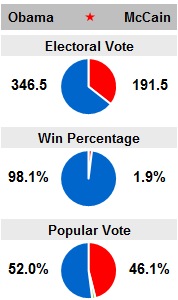Wow.
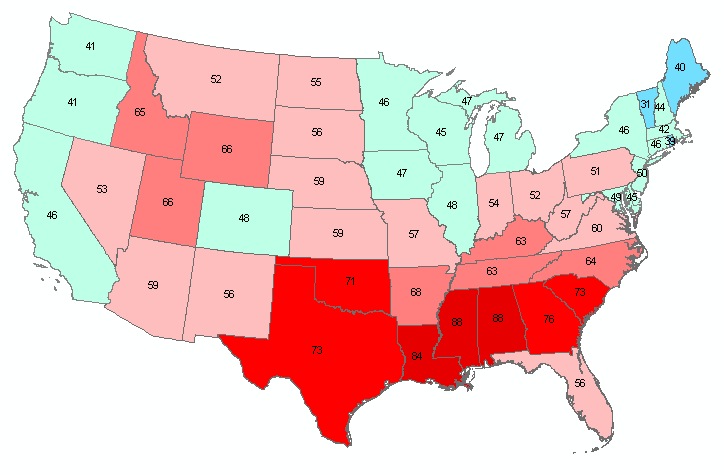
jonathan lundell
Robert Reich.
Why We’re Rescuing Wall Street and Not the Auto Industry: Citigroup Versus General Motors
…
Nonetheless, Citi is about to be bailed out while GM is allowed to languish. That’s because Wall Street’s self-serving view of the unique role of financial institutions is mirrored in the two agencies that run the American economy — the Treasury and the Fed. Their job, as they see it, is to keep the financial economy “sound,” by which they mean keeping Wall Street’s own investors and creditors reasonably happy.Because the public doesn’t understand the intricacies of finance, it’s easily persuaded that this is definition of “soundness” is the same as keeping savings flowing to the banks so that the banks can lend to them to Main Street. That’s why the public and its representatives have committed $700 billion of taxpayer money to Wall Street and another $500 to $600 billion of subsidized loans to the Street from the Fed — bailing out the investors and creditors of every major bank, including , any moment, Citi — only to discover, at the end of this frantic and unbelievably expensive exercise, that American jobs and communities are more endangered than they were at the start.
I have mixed feelings about Fareed Zakaria’s GPS (Sundays, CNN), but he does come up with interesting guests. New to me is Stephen Cohen, professor of Russian studies and history at NYU, and a frequent guest of Charlie Rose (whom I don’t get around to watching, I guess). Cohen was one of Zakaria’s guests yesterday, and his views on Russian external politics were clear and convincing. Of course, you might want to read that as “confirming my own prejudices”, but see if he doesn’t make just as much sense to you.
CNN offers the interview in two parts: one and two. If they get around to posting a transcript, I’ll extract some of it here, but the video is worth your time regardless.
The subjects include Georgia and the tiff over US anti-missileinstallations on Russia’s border. Go watch.
One of my favorite Dean Baker themes.
Politicians as Political Philosophers: Differences at the G-20
The NYT reported today on the political philosophy of that renowned political philosopher, George W. Bush, and how it prevented it from reaching agreement on many issues with the other leaders at the G-20 summit. According to the NYT article “it was clear that bridging ideological gaps among nations afflicted with different versions of the economic contagion would provide the new president and other world leaders with a daunting challenge.”
Maybe the problem is ideology but there is an alternative explanation. The financial sector is an extremely powerful interest group in the United States. It is relatively less powerful in countries like France and Germany, where the financial industry is a smaller share of the economy and other interest groups, like unions play a more important role.
Suppose the President Bush and other U.S. politicians feel the need to respond to the demand of a key interest group that plays an important role in their election. Suppose that the leaders of other countries instead feel the need to respond to the demands of others economic actors who have been hurt by the financial sector?
I don’t know if my description of the motivations of President Bush and other leaders is correct, but the NYT certainly does not know that it is wrong. It is worth noting that the people at the G-20 meeting all got there because of their success in politics, not political philosophy. It would be best if reporters refrained from imputing motives that they cannot know. News reporting should just tell us what the politicians said and did and not speculate about their thoughts.
—Dean Baker
Matthew Yglesias looks at the argument for a Big Three bailout and puts his finger on the problem.
Matthew Yglesias: Bailing Out in the Real World
I feel like some of the commentary on the prospect of an auto industry bailout is starting to remind me of some of the stuff I fell for before we invaded Iraq. The kind of thing where someone yes, “yes this sounds like a bad idea, but if we do it like this and like that and like this then it’ll all be okay, therefore we should do it.” Which is fine. But we also need to ask ourselves, if we accept the proposition of Detroit’s management, the UAW, and Michigan politicians that what’s good for General Motors is good for America, how likely is any of this stuff to happen.
TNR‘s Jonathan Cohn, for example, makes the most persuasive case for a Detroit bailout. Per Krugman’s summary:
If the economy as a whole were in reasonably good shape and the credit markets were functioning, Chapter 11 would be the way to go. Under current circumstances, however, a default by GM would probably mean loss of ability to pay suppliers, which would mean liquidation — and that, in turn, would mean wiping out probably well over a million jobs at the worst possible moment.
In essence, given the credit crunch Chapter 11 bankruptcy won’t work so the only alternative to bailout is liquidation, but liquidation is unacceptable given the macroeconomic situation, so we need to keep GM on life support as a jobs program.
But then read Jon’s colleague Clay Risen also in TNR:
There’s little I could say in addition to Jonathan’s wonderful article laying out the case for a brokered bailout for Detroit. […] But any bailout must be predicated on a planned shrinkage of the three companies. Suppliers need to be transitioned to other firms or industries, employment needs to be gradually reduced, and production facilities need to be shuttered. There should probably be a forced consolidation, too, with GM taking over Chrysler—a move that was already in the works before the credit crunch made it impossible to complete without government assistance.
Now there’s no metaphysical issue or law of nature preventing the government from first keeping these firms on life support as a jobs program, and then when the economy starts recovering beginning to shrink the workforce and drop suppliers. But in the real world, that’s very hard to imagine. If you think it’s politically difficult for politicians to stand aside and do nothing as a situation that threatens to cost a lot of people their jobs develops, just wait ’till you try to tell the White House political office that you want the president to order a round of massive layoffs in key midwestern swing states.
Similarly with all this environmental stuff. GM, Ford, and Chrysler may not be very good at turning a profit by selling cars and trucks but they’ve got a lot of political clout. Perhaps enough to get tens of billions of dollars of taxpayer money. Whatever conditions they agree to, they’ll probably be able to fight off.
I hope I’m wrong about this. But I’m pessimistic. The mere fact that it would be desirable to do something to keep everyone who depends on the car industry for a living that simultaneously restores the domestic car firms’ economic viability and serves environmental policy goals doesn’t make it possible. Generally the reason we try not to have the government running businesses is that promoting public goals and maximizing profits require you to do different things. We normally try to advance policy goals by establishing a framework of taxes and regulations so that firms pursuing their interests will be compatible with the public interest. But if GM is going to be a welfare agency, it’s hard to also expect it to be a viable company that will rapidly get off the federal teat.
Thus Paul Krugman.
This is very big news. One of the key questions about the new Democratic majority was whether Congress would try to play it safe, backing down on big ideas about reform, especially on health care. You can view the whole chorus about how we’re still a “center-right nation” as an attempt by the usual suspects to scare Democrats into scaling back their ambitions.
But now Max Baucus — Max Baucus! — is leading the charge on a health care plan that, at least at first read, is more like Hillary Clinton’s than Barack Obama’s; that is, it looks like an attempt at full universality. (The word I hear, by the way, is that Obama’s opposition to mandates was tactical politics, not conviction — so he may well be prepared to do the right thing now that the election is won.)
So this looks very good for the reformers. There’s now a reasonable chance that universal health care will be enacted next year!
In the Guardian, Dean Baker argues that universal health care would do double duty as an economic stimulus package.
How Obama can save the US economy
Few presidents will come into office having generated the sort of expectations Barack Obama created over the course of his campaign. The country’s economic crisis poses substantial dangers but it also presents enormous opportunities. If President Obama is prepared to seize these opportunities, he will establish himself as one of the countries truly great presidents, alongside Lincoln and Roosevelt.
Specifically, Obama can take advantage of the current economic crisis to announce plans to jump-start national health insurance. Extending health insurance can be an effective stimulus that will provide an immediate boost to the economy. More importantly, it will provide the same access to healthcare that people in other wealthy countries have long taken for granted.
…
Extending healthcare coverage in this way is effectively eating dessert before dinner, but this is exactly what we want to do to counter the recession. It is important that we spend money now to boost the economy. We will be getting double-value if this stimulus can be spent usefully toward meeting a longstanding goal, like providing national healthcare insurance, rather than just buying things at the mall.
Most states allocate their Electoral College electors on a statewide winner-take-all basis. The exceptions are Maine and Nebraska, which give an elector to the winner of each congressional district (the other two electors go to the state wide winner). It’s not quite (or even close to) proportional representation, as evidenced by the fact that neither state has ever split their EC delegation.
 That appears to change as of this election, with the Omaha World-Herald reporting that Obama has won in NE CD-2, which contains Omaha itself. That leaves Obama with 365 electoral votes; only Missouri (11 votes) remains to be decided.
That appears to change as of this election, with the Omaha World-Herald reporting that Obama has won in NE CD-2, which contains Omaha itself. That leaves Obama with 365 electoral votes; only Missouri (11 votes) remains to be decided.
Missing the Stock Bubble and Housing Bubble Makes You Qualified to Fix the Crisis
I have nothing against Larry Summers, but I think there is some sense to having people evaluated based on their job performance. Larry Summers thought the stock bubble was cool, ignored the housing bubble, was in favor of the over-valued dollar and gave warmly supported financial deregulation.
This track record arguably make Summers one of the main villains in the current economic crisis. So why does the LA Times tell us that we need his wisdom to fix the situation?
I have no doubt that Summers is very bright, but his brilliance did not prevent him from supporting the policies that got us into this mess. Why do we think that his brilliance will lead him to choose the best policies to get us out of it?
—Dean Baker
OK, yet another election graphic, NY Times via Sam Wang.
Keep in mind that this is the shift from 2004 to 2008 (no, Utah didn’t vote for Obama). There’s lots to notice, but the most dramatic shift is the dark red, where McCain-2008 did 20+ points better than Bush-2004.
Also of interest is support for the home-state advantage idea: look at Arizona, Alaska, Illinois, Massachusetts, Wyoming, and Delaware. North Carolina is an exception; it went more heavily for Obama despite not having a homeboy in the race this year. Texas is inconclusive.
Travis Kavulla at National Review Online.
Nairobi, Kenya — It must be the first time one country has celebrated the election of another country’s president with a day off. But that is just what has happened here in Kenya, where President Mwai Kibaki, with all the caprice of an African leader, has declared today a public holiday in honor of Barack Obama, whose father was Kenyan. Work is at a standstill, banks are closed, as are all government offices and most shops. (Ironically, Kibaki’s 2007 campaign slogan was ‘kazi iendelee’ — let the work continue.) Bars, however, are open and people are still hawking Obama paraphernalia and stars-and-stripes apparel. And then there are the glue-sniffing street children, who continue to beg. Sad that the first concrete effect of an Obama presidency on Kenya would be to further depress the productivity of a country that could really use a booster shot in that department.
Next thing you know they’ll be agitating for a 60-hour work week.
WSJ has a nice collection.
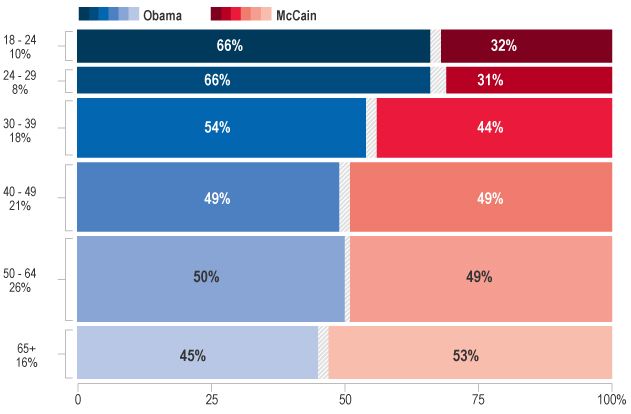
Recent history, that is. That’s an awfully consistent trend for the Democrats, regardless of how well or poorly the Republicans are doing. Curious.
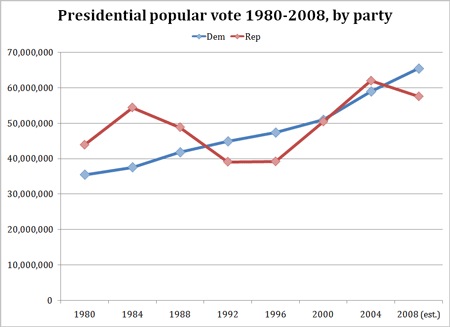
via DKos
Dean Baker thinks it’d be a good idea. (How about we let Dean pick the new CoS?)
The Next Treasury Secretary: What’s Their Track Record?
It would be a really bad start to his administration if President Obama picked a Treasury Secretary who shares a substantial part of the blame for the bubble economy and the financial crisis. It will not be easy to pick up the pieces and get the economy back on its feet, but we would be going in the wrong direction to put one of the people responsible for getting us in this mess in the top economic position in the Obama administration.
Sheila Bair, the current head of the Federal Deposit Insurance Corporation, can boast of clean hands. Unlike other contenders, she never obstructed regulation of the $60 trillion credit default swap market. Nor did she push to maintain the over-valued dollar that gave us an $800 billion trade deficit. Unlike many others dealing with the fallout from the housing crash, she has noticed that people are losing their homes and has made preventing this a top priority.
President Obama has a chance to make a fresh start. He would handicap his administration by relying on those whose mistakes helped to bring about about this economic crisis.
Michael Bérubé. I won’t even try to summarize it, but here’s the opening graf.
Open letter to Governor Palin’s supporters
The election is over. It’s time to put our differences aside, come together as Americans, and reach out across the aisle in a spirit of bipartisanship. And so today I address myself to those of you who were so energized by Sarah Palin’s historic campaign.
Some very nifty election-related graphs from Andrew Gelman. Here are a couple; there’s more where they came from.
A big falloff in Republican votes from young voters:
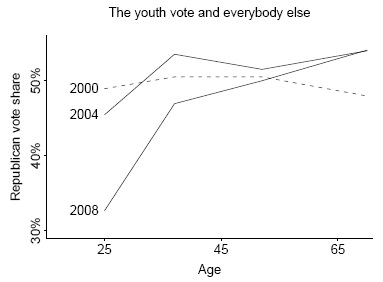
A general shift from R to D (notice that AZ is right on the line; no more support for McCain-2008 than for W-2004):
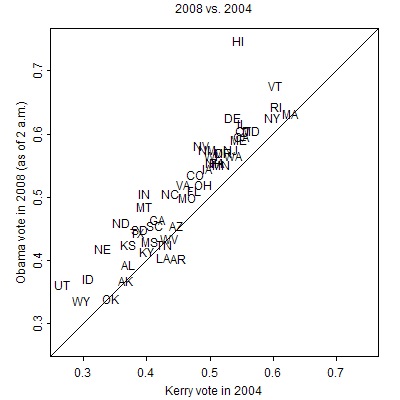
via Kieran Healy
I’m pleased with Obama’s win, on balance, and certainly grateful to be out of earshot of Ms Palin for at least a few months. But let’s not get too carried away.
Can we talk about the real Obama now?
As things now stand, the election primarily represents the extremist center seizing power back from the extremist right. We have moved from the prospect of disasters to the relative comfort of mere crises.
Using the word ‘extreme’ alongside the term ‘center’ is no exaggeration. Nearly all major damage to the United States in recent years — a rare exception being 9/11 — has been the result of decisions made not by right or left but by the post partisan middle: Vietnam, Iraq, the assault on constitutional liberties, the huge damage to the environment, and the collapse of the economy — to name a few. Go back further in history and you’ll find, for example, the KKK riddled with members of the establishment including — in Colorado — a future governor, senator and mayor after whom Denver’s airport is named. The center, to which Obama pays such homage, has always been where most of the trouble lies.
The only thing that will make Obama the president pictured in the campaign fantasy is unapologetic, unswerving and unendingly pressure on him in a progressive and moral direction, for he will not go there on his own. But what, say, gave the New Deal its progressive nature was pressure from the left of a sort that simply doesn’t exist today.
Above are listed nearly three dozen things that Obama supports or opposes with which no good liberal or progressive would agree. Unfortunately, what’s out there now, however, looks more like a rock concert crowd or evangelical tent meeting than a determined and directed political constituency. Which isn’t so surprising given how successful our system have been at getting people to accept sights, sounds, symbols and semiotics as substitutes for reality. Once again, it looks like we’ll have to learn the hard way.
Andrew Brown points out elsewhere that Obama is fundamentally a conservative. ACB seems a little happier about that than I am, but he’s not wrong on the basic point, and I’m no conservative.
I suppose I would have been less shocked and disappointed if Obama had lost than when Kerry did because I could not, still cannot, imagine how anyone could have regarded Bush as even minimally competent by November 2004. But still it was extraordinary to wake at ten past four this morning, and switch on the kitchen radio in the middle of McCain’s concession speech. It was the best news since 1989. I don’t really suppose that Obama can rescue America but what gives me hope is the fantastic volunteer effort that got him elected. It’s impossible to imagine that kind of popular movement in this country, even for donkey welfare.
One other point: Tim Bray, in his comments, was lamenting the absence of a credible conservative voice in American politics. But as far as I can hear, this is exactly the voice they have elected. Just as Kerry was an Eisenhower Republican, Obama seems to me to be exactly the kind of conservative who understands when change is inevitable. The great question is he will prove enough of a statesman to manage things so that everything changes in order for everything to stay the same. Whatever else he is, he’s not a destructive revolutionary, far less so than Bush was in his blundering way.
The Corner’s Mike Potemra.
It happened, almost too quickly, what everyone was waiting for. Is it really possible to sneak up on a crowd of many thousands of people? At 11 PM, the big-screen TV at the corner of 125th Street and Adam Clayton Powell Boulevard in Harlem went very briefly silent, and blank; and then a graphic silently popped up, “Barack Obama Elected 44th President.” It seemed to take forever for the crowd’s resulting murmur to coalesce into a shout, and then a roar. This was not a wish or a test pattern, this was it.
The scene was Congressman Charlie Rangel’s block party celebrating the election of Barack Obama. People of all races and ages were there on this mild Manhattan evening, and they were in a festive mood even before the big news was announced. American flags abounded; a platform preacher repeated “God bless America, God bless America.”
Why was I, a John McCain voter, there? A bit of personal history. I was born in 1964, and on the day I was born the U.S. Supreme Court ruled that Prince Edward County in Virginia had to reopen its public schools. The county had closed the schools because they decided it was better to have no public schools at all than to have to admit black kids into them. Here we are, just 44 years later, with an African-American president, a president elected with the electoral votes of that very same Commonwealth of Virginia.
I voted for John McCain because I admire him immensely as a person, and agree with him on many more issues than I do with Senator Obama. And I ask a rhetorical question: Can we McCain voters, without embarrassment, shed a tear of patriotic joy about the historic significance of what just happened? And I offer a short, rhetorical answer.
Yes, we can.
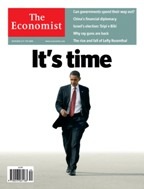
Sam Wang, of the Princeton Election Consortium, weighs in with a final prediction of today’s vote.
PRESIDENT
Electoral vote: The final polling snapshot is Obama 352 EV, McCain 186 EV. The confidence bands are 68% [337,367] Obama EV, 95% [316,378] Obama EV.
Bias analysis: I expect cell phone users missing from landline surveys to give Obama a 1% boost. Based on the bias adjustment I gave you earlier, this scenario brings the median to a level that is still within the 68% confidence band above. I use it as my personal prediction: Obama 364 EV, McCain 174 EV.
Popular vote: The median Obama-McCain margin is Obama +7.0+/-0.8% (n=9, 10/31-11/2). The error bar incorporates assignment of undecided voters. My final prediction is Obama 53%, McCain 46%, third-party candidates 1%.
Over at 538, I don’t see Nate Silver’s “official” prediction (does he do that?), but here’s today’s summary graphic:
